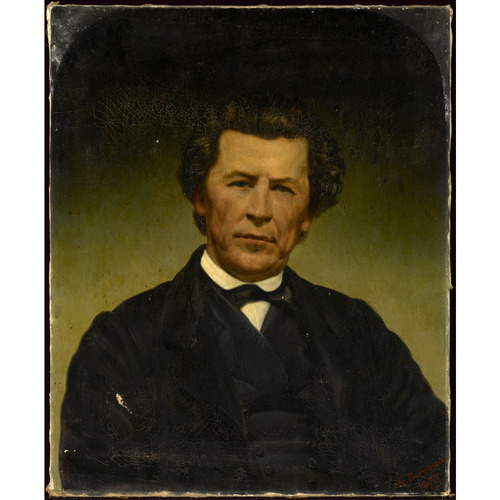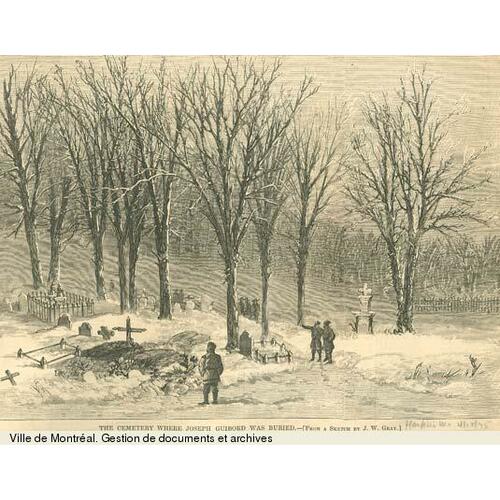GUIBORD, JOSEPH, typographer, member of the Institut Canadien; b. 31 March 1809 at Sainte-Anne-de-Varennes (Varennes, Que.), son of Paul Guibord, dit Archambault, a labourer, and Marie-Anne Célerier, dit Roch; m. 2 June 1828 Henriette Brown in the parish of Notre-Dame de Montréal, and they had ten children, all of whom predeceased him; d. 18 Nov. 1869 in Montreal and was buried 16 Nov. 1875 in Notre-Dame-des-Neiges cemetery.
It is known that in 1838 Joseph Guibord and John Lovell* were printing Le Populaire (Montréal). Later Guibord went to work in Louis Perrault’s printing house. Acknowledged to be skilful and even one of the best typographers in Canada, he was entrusted by Abbé André-Marie Garin, a missionary in the northwest, with the task of printing a catechism in the Cree language, which was published in 1854. Guibord is thought to have introduced stereotype printing in Canada, and to have had a part in printing the first book to be stereotyped in the country. At the time of his death he was a foreman in Perrault’s firm.
Nothing in Guibord’s life predestined him to the fate for which he is known today. Around his mortal remains, however, was waged the last and fiercest battle between the liberals of the Institut Canadien and ultramontanes. The Inquisition’s decree of 7 July 1869 condemned the doctrines “contained in a certain yearbook” – the Annuaire de l’Institut Canadien pour 1868 – and placed it on the Index [see Louis-Antoine Dessaulles*; Gonzalve Doutre*]. On 29 August the parish priests of the diocese of Montreal proclaimed Bishop Ignace Bourget*’s ordinance of 16 July, which stated: “He who persists in the desire to remain in the said Institut or to read or merely possess the above-mentioned yearbook without being so authorized by the [Roman Catholic] Church deprives himself of the sacraments at the hour of his death.” Less than three months later Joseph Guibord died suddenly. As a member of the Institut Canadien he was thus, in the eyes of Vicar General Alexis-Frédéric Truteau*, forbidden to receive the last rites and to be burial in consecrated earth. This final refusal aroused the anger of Institut Canadien’s members, who then prompted Guibord’s widow, Henriette Brown, to take the parish of Notre-Dame to court. It was a famous and unfortunate case that went up through many courts and was not decided until 21 Nov. 1874, when the Judicial Committee of the Privy Council in London ordered that Guibord be buried in the Notre-Dame-des-Neiges cemetery. There were more twists and turns before the burial finally took place on 16 Nov. 1875 [see Charles-Elzéar Mondelet*; Joseph Doutre*]. The next day Bishop Bourget, using his power to bind and to loose, to bless and to curse, declared the place of burial forever “under an interdict and separate from the rest of the cemetery.” And the bishop further pronounced: “There rests a rebel who has been buried by force of arms.”
According to his contemporaries, Joseph Guibord was a worthy man, undeserving of this fate.
ANQ-M, État civil, Catholiques, Notre-Dame de Montréal, 2 juin 1828. Fraser-Hickson Library (Montreal), Archives de l’Institut canadien de Montréal. The Guibord affair, ed. L. C. Clark (Toronto and Montreal, 1971). Le Jeune, Dictionnaire. Notices généalogiques sur la famille Guibord (Ottawa, 1914). La Presse (Montréal), 1er avril 1967. Théophile Hudon, L’Institut canadien de Montréal et l’affaire Guibord; une page d’histoire (Montréal, 1938). Adrien Thério, “Les grandes batailles de Mgr Bourget: l’Institut canadien, l’affaire Guibord et l’université de Montréal,” Perspectives/Le Nouvelliste (Trois-Rivières), 9 (1967), no.20, 29–37; “Mgr Ignace Bourget: novateur audacieux et lutteur intrépide,” Perspectives/Le Nouvelliste, 9 (1967), no.19, 15–23.
Bibliography for the revised version:
Bibliothèque et Arch. Nationales du Québec, Centre d’arch. de Montréal, CE601-S10, 1er avril 1809; CE601-S51, 16 nov. 1875. Ville de Montréal, Section des arch., BM069-P1. Robert Hébert, Le procès Guibord, ou l’interprétation des restes (Montréal, 1992). Léon Pouliot, Monseigneur Bourget et son temps (5v., Montréal, 1955–77), 4. Adrien Thério, Joseph Guibord, victime expiatoire de l’évêque Bourget: l’Institut canadien et l’affaire Guibord revisités (Montréal, 2000).
Cite This Article
Jean-Roch Rioux, “GUIBORD, JOSEPH,” in Dictionary of Canadian Biography, vol. 9, University of Toronto/Université Laval, 2003–, accessed February 27, 2026, https://www.biographi.ca/en/bio/guibord_joseph_9E.html.
The citation above shows the format for footnotes and endnotes according to the Chicago manual of style (16th edition). Information to be used in other citation formats:
| Permalink: | https://www.biographi.ca/en/bio/guibord_joseph_9E.html |
| Author of Article: | Jean-Roch Rioux |
| Title of Article: | GUIBORD, JOSEPH |
| Publication Name: | Dictionary of Canadian Biography, vol. 9 |
| Publisher: | University of Toronto/Université Laval |
| Year of publication: | 1976 |
| Year of revision: | 2024 |
| Access Date: | February 27, 2026 |


![Joseph Guibord [graphic material] Original title: Joseph Guibord [graphic material]](/bioimages/w600.437.jpg)


